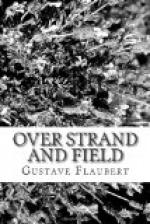At last we heard the beating of tired hoofs on the cobblestones, the tinkling of bells, the cracking of a whip and a man’s voice shouting: “Ho! Ho! Here’s the post! Here’s the post!”
The horse stopped in front of the door, hunched its back, stretched its neck, opened its mouth, disclosed its teeth, spread its hind legs and rose on its hocks.
The animal was lean and tall, and had a moth-eaten mane, rough hoofs and loose shoes; a seton bobbed up and down on its breast. Lost in a saddle that swallowed him up, supported at the back by a valise and in front by the mail-bag, which was passed through the saddle-bow, its rider sat huddled on it like a monkey. His small face, adorned with straggling blond whiskers and as wrinkled and rough as a winter apple, was hidden by a large oil-cloth hat lined with felt; a sort of gray coutil coat was drawn up to his hips and bagged around his stomach, while his trousers stopped at the knees and disclosed his bare legs reddened by the rubbing of the stirrup-straps, and his blue hose, which hung over his shoes. The harness was held together with strings, the rider’s clothes had been mended with threads of different colours; all sorts of patches and all kinds of spots, torn linen, greasy leather, dried mud, recent dust, hanging straps, bright rags, a dirty man and a mangy horse, the former sickly and perspiring, the latter consumptive and almost spent; the one with his whip and the other with its bells—all this formed but one object which had the same colour and movement and executed almost the same gestures, which served the same purpose, the conducting of the Auray post.
After another hour, when all the packages and commissions had been attended to and we had waited for several passengers who were to come, we finally left the inn and went aboard. At first there was nothing but a confused mass of people and luggage, oars that caused us to stumble, sails that dropped on our heads, men falling over each other and not knowing where to go; then everything quieted down, each one found his nook, the luggage was put in the bottom of the boat, the sailors got on the benches, and the passengers seated themselves as best they could.
There was no breeze and the sails clung limply to the masts. The heavy boat hardly moved over the almost motionless sea, which swelled and subsided with the gentle rhythm of a sleeping breast.
Leaning against one of the gunwales, we gazed at the water, which was as blue and calm as the sky, and listened to the splashing of the oars; sitting in the shadow of the sail, the six rowers lifted their oars regularly to make the forward stroke, and when they dipped them into the water and brought them up again, drops of crystal clung to their paddles. Reclining on the straw, or sitting on the benches, with their legs dangling and their chins in their hands, or leaning against the sides of the boat, between the big jambs of the hull, the tar of which was melting in the heat, the silent passengers hung their heads and closed their eyes to shut out the glare of the sun, that shone on the flat ocean as on a mirror.




